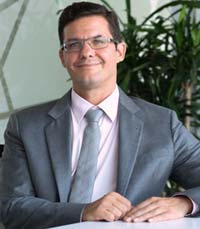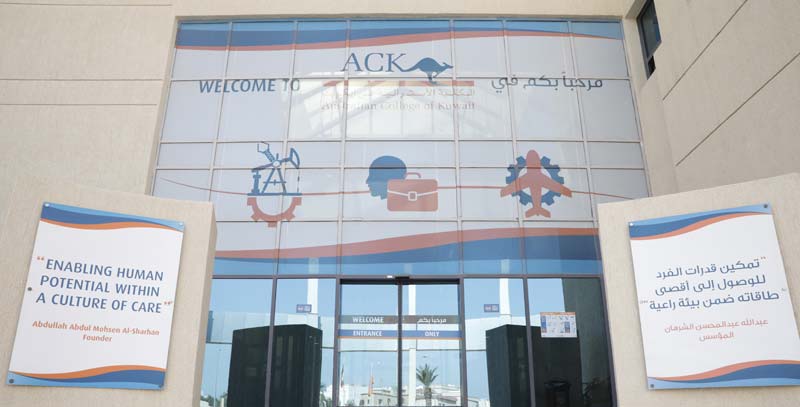 Dr Sa'ad Al-Omari
Dr Sa'ad Al-OmariKUWAIT: Established initially to grant Diploma Degrees based on two-year programs, ACK evolved over the years into an institution with strategic international ties, fulfilling regulatory and academic accrediting requirements and offering Diploma and Bachelor programs in Engineering, Business, and Aviation.
ACK's mission has always been to fulfill its strategic direction of graduating capable lifelong learners and engaged professionals who can contribute to Kuwait's socioeconomic and national development plan associated with the New Kuwait 2035 Vision. We enable human potential within a culture of care that provides students with academic and career advice, learning support, employment and internship opportunities and access to continuous learning and professional development options.
ACK adheres to UNESCO's six pillars of education which are as follows: learning to know, learning to do, learning to be, learning to live together, learning to get employed and learning to transform. We believe that an individual's acquisition of new knowledge and skills is heavily influenced and supported by the social environment in which the learning occurs. We view learning as an active and social process. The following are excerpts from an interview with Dr Sa'ad Al-Omari, Chairman of the Australian College of Kuwait:
Lessons learned
1. The higher education landscape, like many other sectors, has felt firsthand the impact of COVID-19. What are some of the lessons learned from this pandemic?
Dr Omari: Without a doubt, this pandemic has created great challenges for us all. However, no matter how difficult, one must look at them as opportunities for adaptation, learning, and discovery. From a higher education perspective, we have learned the importance of resilience, agility and adaptability.
One of the significant steps we took at the Australian College of Kuwait during the pandemic was to review our study programs to ensure that our post COVID graduates have the necessary transferrable skills that will allow them to succeed in unprecedented times. The pandemic also led to increased sharing of knowledge via joint research projects among colleges and universities.
New tools and mechanisms to disseminate knowledge effectively, are called for. We do not know the long term impact of the pandemic. To ensure that our programs of study meet the needs of the industry and workforce, we need to diversify our offerings and implement an approach based on 'research-informed teaching'. We should embrace the digital transformations that resulted from this pandemic. The higher education sector must invest in optimizing its digital infrastructure. Distance Learning/E-learning and blended learning are the future.
2. The pandemic has validated the need for international collaboration and cooperation. Could you expand on this notion and explain what are the measures adopted by ACK in this regard?
Dr Omari: The importance of being connected has never been clearer. The activities of universities in research, innovation, and education are designed to increase the capacity to exchange knowledge. During the crisis, many universities worked closely together to learn from and help one another navigate new realities.
When international research projects came to a sudden halt during lockdown periods, universities found creative ways to continue their collaborations. As a higher education institution, we must always ask ourselves, are we effectively exchanging knowledge with the right partners? Industry? Society? We are proud that we have built a diverse network of international partners that provide our faculty with opportunities to conduct joint research on a global scale.
We collaborate with local institutions such as the Kuwait Foundation for the Advancement of Sciences (KFAS) and the Kuwait Institute for Scientific Research (KISR), and internationally we work closely with Central Queensland University (CQUniversity) in Australia. In addition, we are also engaged in research projects in Canada, and Europe. Through our partnerships, we generate a global mindset for our students and graduates to prepare them to continue their studies with our international partner in Australia and other universities.
Upcoming strategy
3. Could you walk us through the major highlights and pillars of your upcoming strategy? With the pandemic's effect taken into consideration, how was the design and development of the strategy impacted?
Dr Omari: The 2020-2025 Strategic Plan provides a clear roadmap to achieve our vision. It aims to position ACK as a national and regional leading higher education institution in teaching, learning, research, and innovation while remaining true to our core value of 'Enabling Human Potential within a Cultural of Care'.
We have fine-tuned ACK's strategic direction to accommodate the rapidly evolving needs and challenges of industry. 'Excellence in Making a Difference' will be ACK's motto for the next five years. Our strategy includes the following:
* Adding programs of study that meet the demands and skills of the workplace;
* Evolving teaching and learning to meet the needs of our students through innovative pedagogy;
* Fostering competencies of leadership and entrepreneurship;
* Investing further in the College's infrastructure and technical teaching tools;
* Strengthening the College's relationship with industry and exchanging knowledge; and
* Contributing to sustainable development through research and innovation that will address national priorities.
4. At times, the industry's demands and their needs progress faster than the ability of higher education's to adapt. Higher education, businesses, and the industry need to work together to deliver more value to the students and to the workforce. As a higher education provider, what education model and supportive ecosystem have you developed to ensure collaboration with the different sectors of industry?
Dr Omari: By aligning our learning outcomes to needs of the job market, our role is critical in closing the skills gap facing the industry. We work closely with industry on several levels and we conduct joint research that addresses their need to optimize productivity.
Our students also work in teams and/or individually to research an industry or a business issue and then proceed to develop strategies, processes, and products as solutions. All students are required to research and present a major graduation project to demonstrate the synthesis of individual aspects of learning during their studies and apply this to an approved workplace project or challenge. Upon completion, these projects are exhibited as innovative solutions to everyday issues facing industry. Industry in turn, has successfully adopted the outcomes of several of our graduation projects.
To develop their projects, students are encouraged to connect with local businesses and research organizations. In many instances, this has led to further research and employment. Our students are also engaged in internships and work placements in industry as part of their studies.
ACK has established an Industrial Advisory Board at different levels (College and School). The Board comprises industry professionals from the private and government sectors who provide strategic advice on areas of research, development, and curricula. Such alliances ensure that ACK delivers industry-required skills and produces research that is beneficial to the development of the economy and society. At ACK we are also strong advocates of lifelong learning and provide ongoing education for industry professionals through our Corporate Training Center.
Skilled graduates
5. As Kuwait is seeking to diversify its sources of income, the role of higher education has never been more important in developing skilled graduates that can contribute to the nation's economy. How does ACK endeavor to support its graduates and alumni?
Dr Omari: In general, Arab countries have been seeking to transition from resource-based to knowledge-based economies and have been diversifying and expanding their base of human capital skills. An example that demonstrates the adoption of important steps toward this end is the national strategy adopted by the State of Kuwait, namely, the 'New Kuwait Vision 2035.' The plan aims to transform the country into a regional, financial, commercial, and cultural hub. The Vision is organized around seven pillars: global positioning, developed infrastructure, creative human capital, effective public administration, high quality healthcare, diversified economy, and sustainable environment.
One of the seven pillars identifies investment in human capital; another identifies economic diversification as a crucial element to reducing the country's dependence on oil export revenue. The Vision seeks to reform the education system to prepare Kuwaitis to become competitive and productive members of the workforce.
We have established an Alumni and Career Placement Center to support our graduates and as part of our commitment to lifelong learning by establishing connections with alumni in the workplace, the Center was able to build partnerships with leading companies from the private and public sectors.
Through an integrated leadership that joins the schools of Business and Engineering, we established the Innovation and Entrepreneurship Center, to encourage and support novice entrepreneurs. Entrepreneurs are essential to economic growth, diversification and job creation. Our pedagogy serves to transfer practical knowledge and develop skills that facilitate the work of entrepreneurs. We organize an annual exhibition where entrepreneurs are given the opportunity to showcase their businesses and start-ups.
6. Many are of the opinion that distance learning/e-learning will fade away once the pandemic is over. What is ACK's take on that? What is the future of distance learning/e-learning in the Arab higher education sector post COVID?
Dr Omari: Distance Learning/E-learning is here to stay. This is a new transition that we must embrace and accept. It is also a cultural transition within the Arab region as E-learning has not been widely implemented in this part of the world. The pandemic managed to expedite what was already a long time coming.
ACK has always been a strong supporter of this mode of learning. In fact, in September 2019, before the pandemic, the College organized an international seminar with the Kuwait Foundation for the Advancement of Sciences on the importance of introducing E-learning in the Arab region. Prominent local, regional, and international academics were invited to contribute. We support the continuation of E-learning even after the pandemic has passed.
The College's experience in the last few months of implementing E-learning has been very successful. Open communication channels and transparency were key in the successful implementation of E-learning. Through tutorials, students were supported in their transition to online learning. They were assigned academic advisors and the Department of Student Affairs provided counseling.
Through E-learning, education and assessments have become closer to real life. Students studying from home acquire a range of skills that will allow them to be productive, disciplined, motivated and organized. These skills are very important as they navigate their way through a dynamic and thoroughly transformed workforce.
7. How is innovation cultivated at ACK? Could you also walk us through some of the approaches adopted by ACK toward Fourth Industrial Revolution (Industry 4.0) which includes cyber-physical systems, the internet, cloud and cognitive computing?
Dr Omari: Industry 4.0 requires us to have transferrable skills. This sums up ACK's education objectives, namely, ensuring its graduates possess a range of 'transferrable skills'. Twenty first century skills require students to be thoughtful leaders, learn how to collaborate, solve problems, think analytically and critically, be creative, have high levels of digital literacy, be adaptable, resilient and agile, work in team-settings, think like entrepreneurs, be culturally aware and act as global citizens.
Through our student-centered pedagogy and project-based learning, all these skills are taught and sharpened. Our pedagogical approach also implements the Conceive-Design-Implement-Operate (CDIO) criteria, which emphasize the students' ability to analyze, synthesize and test. All of these are important skills in Industry 4.0.
8. There is no doubt that information communication and technology has the ability to transform the way higher education institutions conduct their activities. What is the role of Information and Communications Technology (ICT) at ACK? And how is it used in the processes of knowledge creation, management and dissemination?
Dr Omari: As I stated earlier, one of the most important lessons we have learnt in this pandemic is that the higher education sector needs to invest heavily in ICT infrastructure. Technology is the present and the future and we must channel our resources in that direction. When the pandemic began, ACK was able to easily switch to emergency remote teaching through its robust ICT infrastructure.
ICT is integrated into all of ACK's activities, and we continuously update our digital resources to ensure we are using state-of-the-art technology. For instance, we have virtual labs that allow students to virtually simulate lab work. In research, ICT is core in sharing and exchanging knowledge. Our scholars are able to conduct joint research projects with faculty around the world. ICT also serves as a tool for collaborative learning as it is integrated into every aspect of ACK's academic pillars, from teaching/learning to assessments and evaluation.
Lasting impact
9. The pandemic will have a long lasting impact on many sectors. Many industries will suffer and some will emerge better off post COVID. The higher education sector has also been left struggling. What long term impacts can be expected on the higher education sector in Kuwait following the pandemic? Post COVID shock, what is ACK doing to build resilience?
Dr Omari: We are beginning to understand the real impact of the pandemic. Like other sectors, the higher education sector took a big hit. When the world went into lockdown, campuses stood empty, halls of residence were evacuated and student enrollment dropped. Suddenly, many universities and colleges were left struggling financially and had to restructure and explore new sources of income.
Kuwait has a robust higher education sector. It responded quickly to COVID-19 and was able to shift to E-learning within a relatively short time. As Kuwait is already expanding its higher education sector with more universities and colleges entering the landscape, the goal is to ensure that these institutions offer skills that are relevant in the post COVID era.
As higher education institutions, we must take into account national strategies; increase our appetite for interdisciplinary research; design a systematic approach to knowledge development; network efficiently and effectively, and develop our ICT infrastructure. All of these are essential. At ACK, we believe resilience is the key to growth in the next few years. We are navigating uncertain times, and we have adapted our strategy to become more agile and resilient.
We have developed our study programs to ensure that our graduates have all the necessary skills to navigate this new environment. We are expanding our networking and collaboration platforms, locally and internationally. We plan to expand our offerings to include a range of new programs that will meet the market's needs.
We have integrated research into all of our programs of study. Through our Scientific Research Center, our faculty are engaged in research projects that meet the nation's needs and make an impact within our society. Kuwait has many technologically savvy young people, and with the right national and institutional strategies, the higher education sector can emerge from this pandemic stronger than before.
10. On a final note, how are leadership and its competencies integrated into ACK's programs of studies? How is this notion conceptualized at ACK, and why is it so important for students and graduates?
Dr Omari: Now, more than ever, we must focus on the notion of 'leadership development' to ensure our students are prepared to deal with the challenges of these difficult times. Through ACK's programs of study, we aim to develop behavioral competencies. We instill a leadership mindset and skills through our Project Based Learning courses, Research Based Learning, internships, and graduation projects. Our mentoring environment paves the way for integrating programs to ensure students gain a wide range of skills and competencies.
Our innovative pedagogy and activities are geared toward ensuring our students develop leadership competencies. We have ensured that our programs are co-created with industry and accredited by the relevant bodies so that they are aligned with the labor market and produce graduates that have the competencies and skills required by the workforce.
For instance, our engineering programs are accredited by Engineers Australia, the School of Business is accredited by the Accreditation Council for Business Schools (ACBSP) and the School of Aviation programs are accredited by the European Aviation Safety Agency (EASA) and are approved by the Directorate General of Civil Aviation (DGCA), and the General Civil Aviation Authority of United Arab Emirates (GCAA). Effective leaders are thoughtful, humble, inspired, committed, and articulate. We want our graduates to make a difference in the world but at the same time remain true to themselves.












